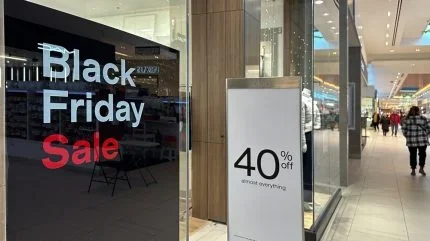This year’s holiday shopping season is one of the shortest in recent memory, with only 26 days separating Black Friday and Christmas Eve.

This year, the calendar has squeezed the time between Black Friday and Christmas Eve to just 26 days, five fewer than last year. The shorter window stems from a later-than-usual U.S. Thanksgiving, and its impact on holiday shopping patterns is already evident.
Tandy Thomas, marketing expert and E. Marie Shantz fellow at Queen’s University, explained the ripple effect.
“With five fewer days between Black Friday and Christmas this year, we can expect to see retailers doing everything they can to get consumers in stores earlier than usual,” Thomas said in an email.
Retailers have responded by launching pre-Black Friday sales even earlier than usual, hoping to spread out consumer spending over the compressed timeframe.
Some stores began displaying holiday merchandise well before Halloween, with chains like Costco, Dollarama, and Winners stocking shelves as early as late October.
TJ Flood, president of Canadian Tire Corp., acknowledged this shift during a recent earnings call. “We’ve got to think through our marketing campaigns and the lead-up to Black Friday and then also the last sprint between Black Friday and Christmas, so we’re being very, very aggressive in recognising that,” he said.
Consumer spending trends
While Black Friday remains the single most significant shopping day for Canadians, some shoppers are altering their habits. A Retail Council of Canada survey found 26% of respondents delaying their holiday purchases until Black Friday or later.
Yet, even with a shorter holiday season, spending is projected to rise. The survey revealed that Canadians expect to spend an average of $972 on holiday shopping, an 8% increase from last year.
However, the rush to complete holiday shopping in fewer days could come at a cost. “The biggest risk with fewer shopping days is that consumers feel rushed,” said Thomas. “With rushing comes poorer decision-making and a higher likelihood of overspending or buying unnecessary items.”
Despite this, not all experts believe the compressed timeline will drastically affect shoppers. Liza Amlani, co-founder of the Retail Strategy Group, argued that consumers now have more choices than ever, both in-store and online. “The shortened golden period won’t impact customers,” she said.
Retailers navigate the challenges
For many retailers, the shortened season has heightened the stakes. Spin Master Corp., the company behind popular toy brands like Paw Patrol and Hatchimals, has strategically adjusted its marketing to maximise impact.
CEO Max Rangel noted during an earnings call that the company aimed to “focus on when consumer intent is at its highest point within that window.”
Yet, some believe retailers are overstating the issue. “Retailers plan their assortments a year in advance, so having five fewer days to sell products is not new news,” said Amlani. She contended that underperforming retailers might use the shorter season as a scapegoat for unmet sales targets.
As the holiday shopping frenzy ramps up, both retailers and consumers will face unique pressures.
The shortened season may favour those who plan strategically while posing challenges for last-minute shoppers and businesses relying on the final days to hit their goals.
Source from Retail Insight Network
Disclaimer: The information set forth above is provided by retail-insight-network.com independently of Alibaba.com. Alibaba.com makes no representation and warranties as to the quality and reliability of the seller and products. Alibaba.com expressly disclaims any liability for breaches pertaining to the copyright of content.




